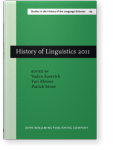The reception of Court de Gébelin in 19th-century Portuguese grammar
The case of the anonymous Regras de Grammatica Portugueza (1841)
Referring explicitly to its sources on the title page, the anonymous Portuguese grammar Regras de grammatica portugueza segundo os principios de grammatica universal (1841) claims to be based on two sources pertaining to the more recent school of the French Grammaire générale. The French grammarians are Antoine Court de Gébelin, author of a universal grammar (Histoire naturelle de la parole, ou grammaire universelle of 1776), and Roch-Ambroise Cucuron Sicard, author of a general grammar (Élémens de grammaire générale, appliqués a la langue française of 1799). The present paper aims at illustrating the most important aspects of the reception of Court de Gébelin’s grammar by this anonymous grammarian.
